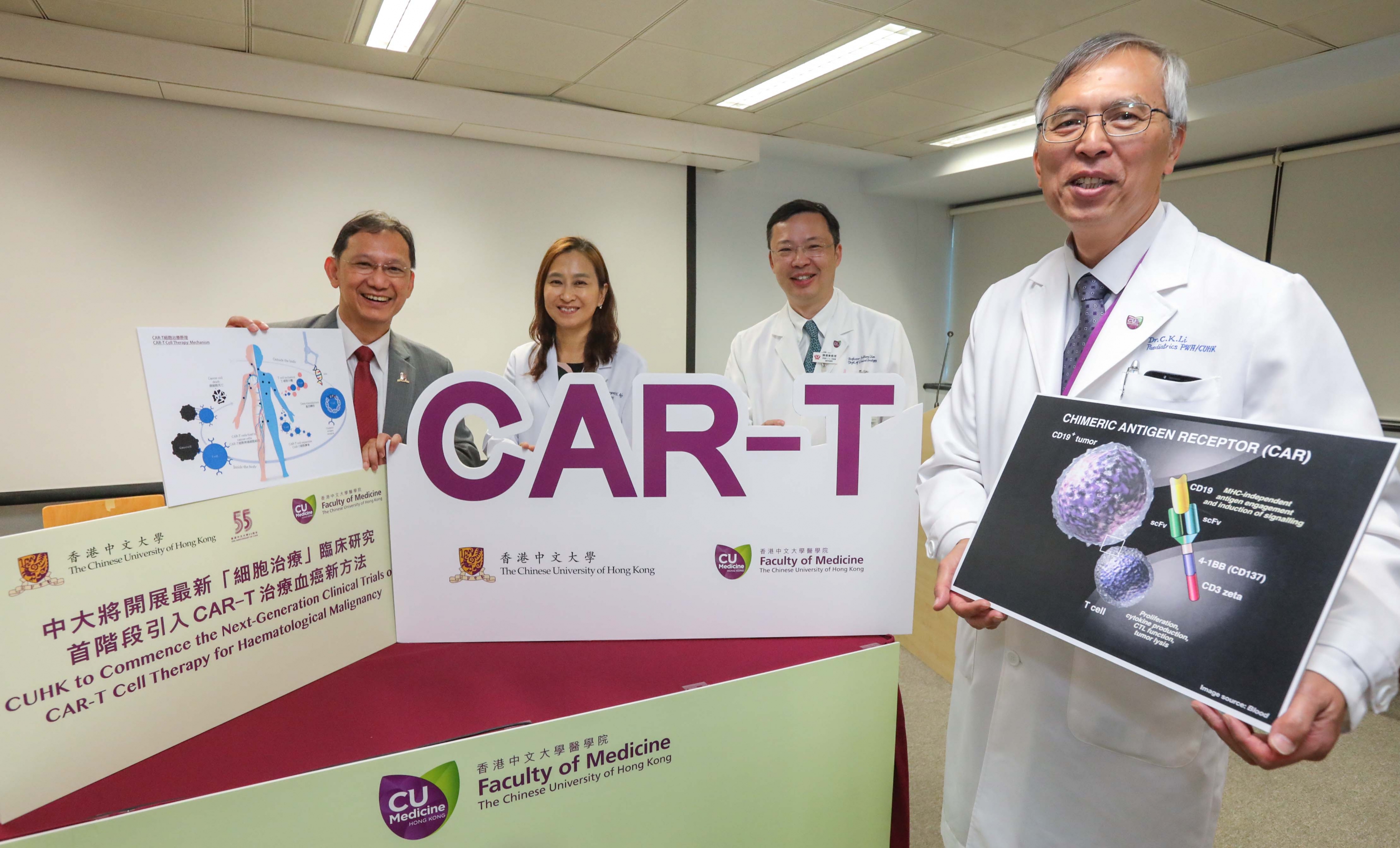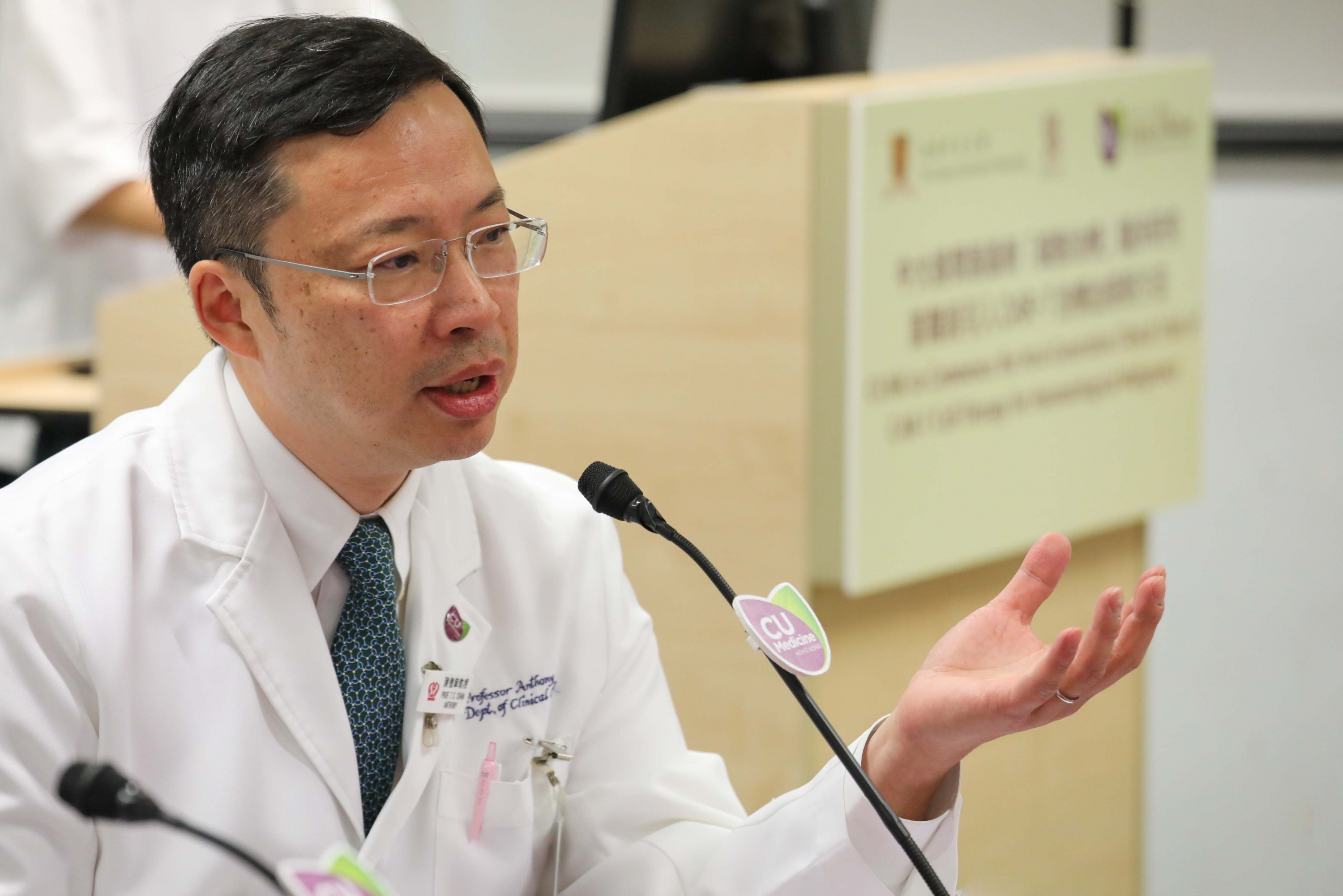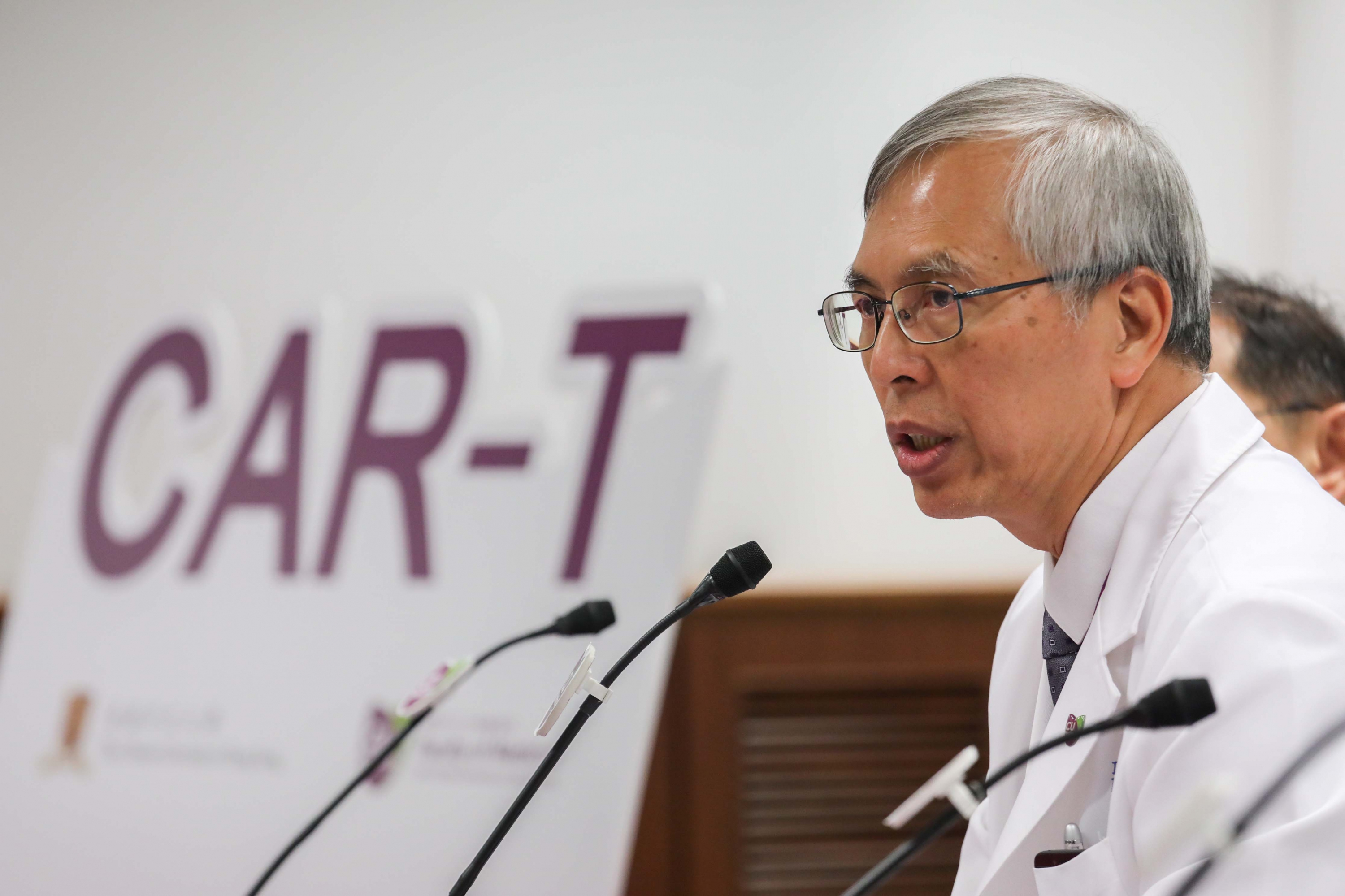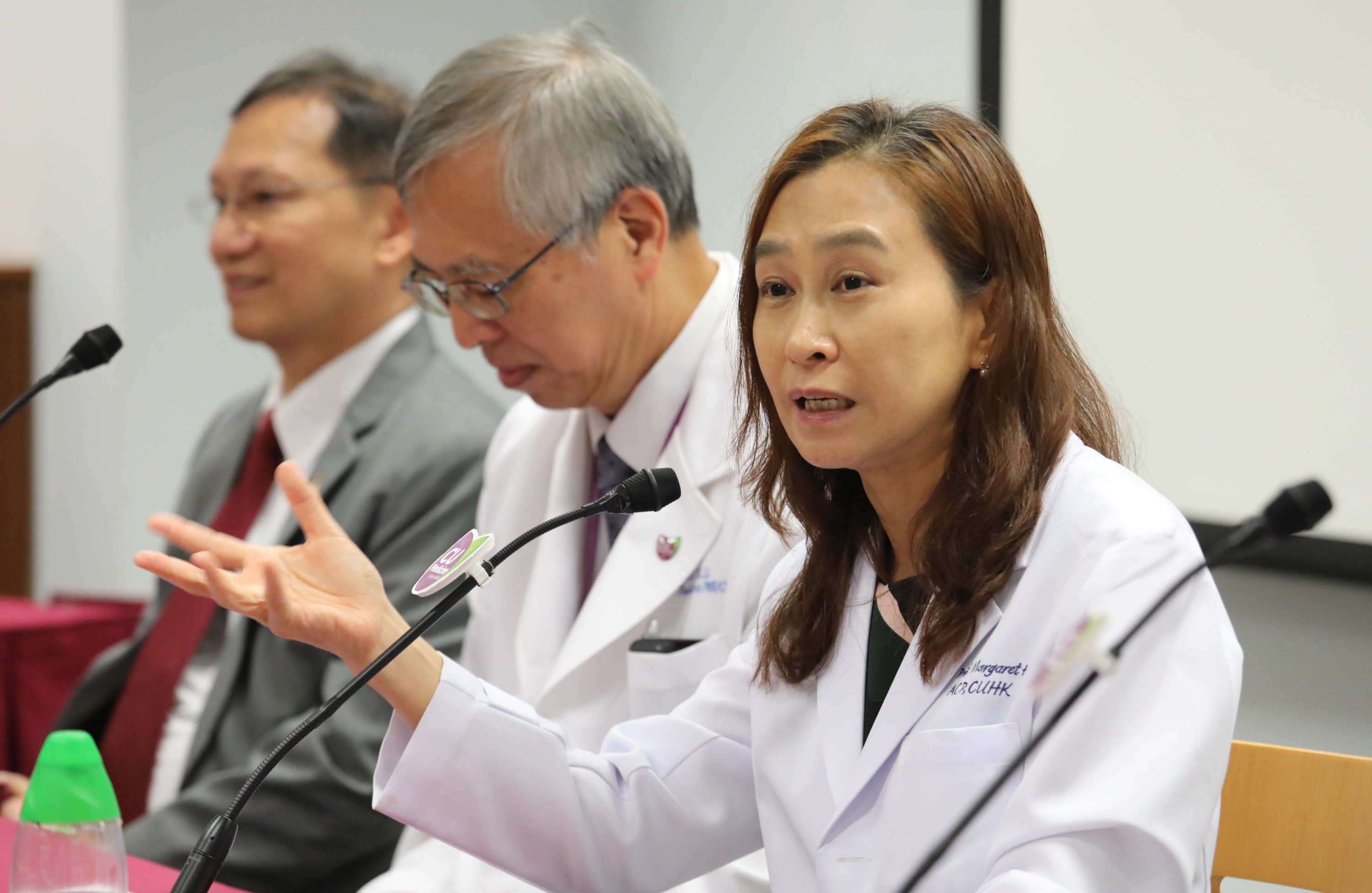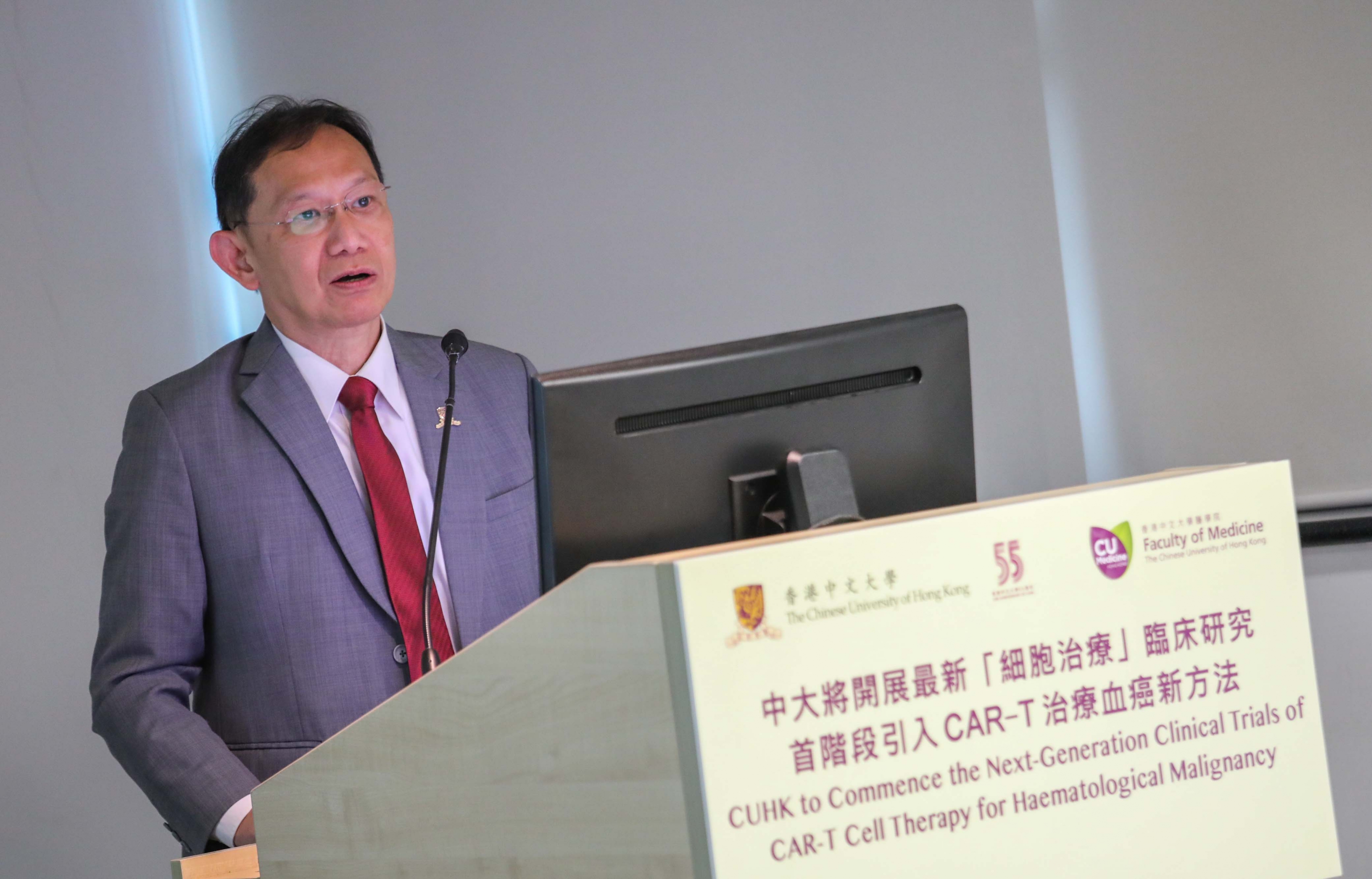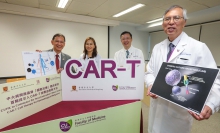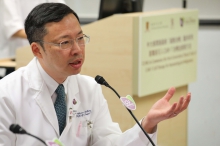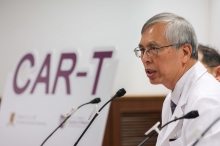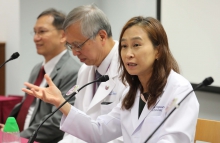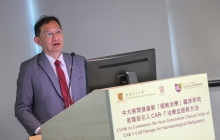CUHK
News Centre
CUHK to Commence the Next-Generation Clinical Trials of CAR-T Cell Therapy for Haematological Malignancy
The Chinese University of Hong Kong (CUHK) will commence clinical trials of Chimeric antigen receptor-T cell (CAR-T cell) therapy, with the first phase targeting patients with haematological malignancy. The plan is to increase the survival rate and prolong overall survival for these patients. To accomplish this goal, CUHK is planning to establish Hong Kong’s first CAR-T cell laboratory licensed with Good Manufacturing Practice (GMP). It is expected to complete construction in 2020 and start clinical trials once the GMP licence is obtained. The research team hopes the therapy can further cover patients with other cancer types in the future.
CAR-T cell therapy builds radar on immune cells to detect cancer cells and launch attack
Cancer is the number one killer in Hong Kong. Haematological malignancy, including leukemia and lymphoma, counts as one of the top ten cancers in mortality. There is an average of 2,000 new cases each year in Hong Kong. Half are under the age of 65 and many of them are children and young patients.
Chemotherapy is the conventional treatment of haematological malignancy, with a cure rate ranging from 30% to 80%. However, it carries side effects and complications as normal cells are also damaged in the process. When chemotherapy fails, haematopoietic stem cell transplant serves as salvage therapy where 30% to 60% of patients can be cured. However, complications can also be significant.
Professor Anthony Tak Cheung CHAN, Li Shu Fan Professor of Clinical Oncology, Faculty of Medicine at CUHK and Director of Sir YK Pao Centre for Cancer at the Hong Kong Cancer Institute, remarked, “Cancer treatment can be difficult when cancer cells mutate and become refractory. Patients often have to seek a new treatment after a while and therefore it is crucial to find a therapy that can achieve long-term efficacy as well as fewer side effects.”
Immunotherapy has been a hot topic in cancer treatment in recent years. It helps enhance patient’s immune system to clear cancer cells. Among all, cellular therapy utilises patient’s own immune cells to tackle cancer cells. A patient’s immune cells are genetically manipulated so as to recognise the cancer cells and exert a killing effect. Patients under this therapy may achieve long term survival. CAR-T cell therapy is one of these types.
Professor Margaret Heung Ling NG, Professor of the Department of Anatomical and Cellular Pathology, Faculty of Medicine at CUHK, explained, “To conduct CAR-T cell therapy, we first have to extract T cells from patient’s blood. T cells are the cells of the immune system that fight infections and can kill cancer cells in the right circumstances. But some of the cancers can evade the immune system. Upon taking the patient’s T cells, we modify them in a qualified laboratory and build in radar-like receptors on the cells, allowing them to recognise and attack cancer cells after being reinfused into the patient’s body.”
Professor LI Chi Kong, Professor of the Department of Paediatrics, Faculty of Medicine at CUHK, added, “CAR-T cell therapy helps patients fight cancers with their own immune system. Since the modified T cells are targeting specifically the cancer cells with the receptors, the therapy reduces the harm to normal cells. The therapy will help patients maintain in vivo anti-cancer activity and thus prolong overall survival.”
Facility construction expected to be completed in 2020 and attain GMP
CAR-T cell therapy requires a qualified “clean” laboratory to prepare the anti-cancer cells. The facility CUHK is planning to build will enable the special manipulation of T cells to happen, which includes “genetic modulation of cells” and “expansion of cells to adequate quantity and to achieve maximal killing of cancer cells”. The team will also train staff to specialise in handling the procedures. The design and structure of the facility will maintain the highest quality of safety and meet the GMP standard.
Dr. Daniel H.S. LEE, Associate Vice-President (Innovation and Enterprise) of CUHK remarked, “We will join hands with the Hong Kong Science and Technology Parks Corporation on the project, with the goal to complete construction in 2020 and officially conduct clinical trials once GMP is obtained. We believe this innovative development will provide more treatment choices to patients in Hong Kong and neighbouring regions.”
To explore possibility of applying CAR-T cell therapy to other cancer types
Two types of CAR–T cell therapies are currently available in some overseas centres for patients with leukemia and lymphoma. Professor Li added, “CUHK is working day and night on the preparation of CAR-T cell therapy clinical trial for child and adult patients with leukemia or lymphoma. We carry high hope that this next generation therapy will become available in Hong Kong. Our another goal is to carry out clinical trials testing different types of CAR-T cell therapy for different types of cancers.”
CUHK will commence clinical trials of CAR-T cell therapy, with the first phase targeting patients with haematological malignancy. The plan is to increase the survival rate and prolong overall survival for these patients.
Professor Anthony CHAN, Li Shu Fan Professor of Clinical Oncology, Faculty of Medicine at CUHK, hopes that the CAR-T cell therapy can further cover patients with other cancer types in the future.
Professor LI Chi Kong, Professor of the Department of Paediatrics, Faculty of Medicine at CUHK, states that the CUHK is working on the preparation of CAR-T cell therapy clinical trial for child and adult patients with leukemia or lymphoma. The research team carries high hope that this next generation therapy will become available in Hong Kong.
Professor Margaret NG (right), Professor of the Department of Anatomical and Cellular Pathology of the Faculty of Medicine at CUHK, explains that in CAR-T cell therapy, a patient’s T cells are genetically modified to build in radar-like receptors on the cells. The T-cells can recognise and attack cancer cells after being reinfused into the patient’s body.


